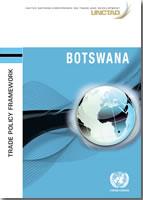
The current National Trade Policy for Botswana (NTP) envisages its review to take place every five years from its first implementation, which took place in 2010. Therefore, in line with this provision, the Government of Botswana, in collaboration with the United Nations Conference on Trade and Development (UNCTAD), commissioned a review of the current NTP with a view to develop a zero draft of the NTP for the period 2016-2020.
This review consists of two parts: the first report, the "Assessment Report", presents the different developments of the trade policy framework since 2010, evaluating its contribution to Botswana's trade performance.
A second report, the "National Trade Policy 2016-2020", will be an update of the current trade policy, incorporating proposals for the realignment of objectives, instruments and guidelines to be adopted by the Government of Botswana.
The two main objectives of this Assessment Report are:
- To provide an in-depth assessment of Botswana's trade performance and its engagement in the world trading system at the bilateral, regional and multilateral level, taking into account policies and economic developments that have occurred since the adoption of the National Trade Policy.
- To identify the economic, policy and institutional constraints and opportunities faced by Botswana.
The aim of the report is to serve as the basis for the development of the National Trade Policy 2016-2020.
A number of key messages emerge from the Assessment Report:
Botswana has experienced difficulties in achieving the level of diversification expected from the various trade-related policies adopted.
The economy continues to be driven by the mining sector in general, and the extraction of diamonds in particular, whose importance in the economy has increased over the years. A key challenge facing the authorities will be to leverage trade - both domestically and internationally - to diversify the economic structure, moving away from a mineral-based economy. Special Economic Zones (SEZs) will play a critical role in achieving this objective. The Government should also promote those sectors with more effective competitive advantage, transforming those emerging sectors that are shielded from competition into internationally competitive sectors by building a culture of clustering and value retention.
The institutional framework and regulatory environment need to be strengthened.
Whether a trade policy fails or succeeds depends to a large extent on the institutions dealing with the formulation, implementation and evaluation of the policy. The institutions in Botswana dealing with trade-related matters are numerous and complex, with overlapping functions and responsibilities. In addition, implementation commitments and policy measures sometimes face difficulties. Botswana needs to rationalise and reinforce its institutional mechanisms to ensure a successful and timely implementation of the adopted policy. At the same time, Botswana should use the Aid for Trade Facilities to its advantage to build stronger institutions.
Botswana enjoys enviable preferential market access provisions to the world's main markets.
Botswana benefits from preferential market access to the European Union (EU), through the recently concluded Economic Partnership Agreement (EPA), and to the United States (US), through the African Growth and Opportunity Act (AGOA). It has also ratified Regional Trade Agreements (RTAs) with MERCOSUR and EFTA, and is currently in negotiations with India. Botswana also enjoys preferential market access to Southern Africa's markets through SACU and SADC. However, traders are facing major constraints, with importers subject to a series of conditions and license requirements which impede the importation of certain products, affording protectionism to the domestic industry. Also, exporters may not be able to export their products because of their inability to comply with the different technical requirements or sanitary and phyto-sanitary measures imposed by the receiving country. Another general concern is that some products may be unable to qualify as Botswana-originated under the individual Rules of Origin (RoO), and therefore do not benefit from preferential market access.
Addressing the private sector's competitive environment can be a key instrument to realise the objectives of the NTP.
Policies on unfair competition, environment and labour, among others, play a critical role in the development of the competitiveness of the private sector, and, therefore, in its trade performance. Botswana needs to consider the sequencing, duration and effects that its trade policy instruments have on the private sector's capacity to export to foreign markets at competitive prices.
Monitoring agreements and trade flows is essential in a proactive trade policy.
There is currently very little monitoring of trade indicators, regional integration indicators or trade flows in order to gauge the success of agreements and to seek new opportunities. Equally, trade defence instruments are difficult to introduce in the absence of such monitoring to identify surges. A proactive trade policy framework should be assessing the benefits derived from agreements and propose measures to remedy any constraints to those benefits.


